2014 Salary Survey of Embedded Developers
The latest data for 2018 is here.
In 2014 readers of The Embedded Muse and Embedded.com participated in a short survey whose results are summarized in this document.
| Suggestion: Subscribe to my free newsletter which often covers salary prospects in the embedded systems industry. |
This is not a scientific survey! No tests were performed to ensure the accuracy of the data, and one would be wise to understand that participants may have confused local currency with US dollars, or to make other mistakes. Still, the data is interesting and paints at least a broad picture.
To try and get some insight I divided the world into several camps. "Americas" means North and South America except the USA and Canada. More than half of the respondents were from the USA, and here's the distribution:
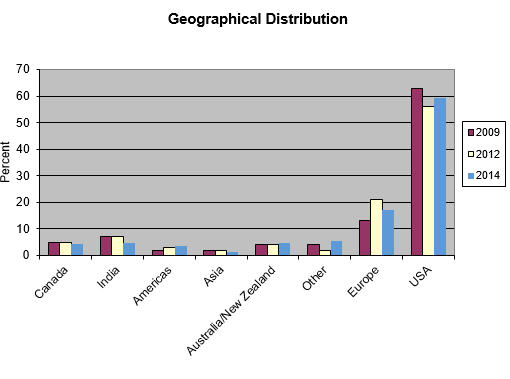
Age and Experience
We continue to age. The following graph shows that the upper age bins are filling as years go by.
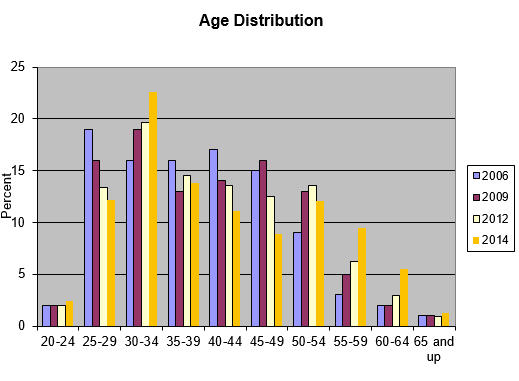
Age and experience correlate, of course. Note, in the following graph, the marked increase in years of experience in Asia, India and "other" (non-Western) locations. The experience in the USA mirrors the three elapsed years since the last survey. Unsurprisingly the Western world has significantly more experience than other locations, but as the boomers retire that difference will shrink.
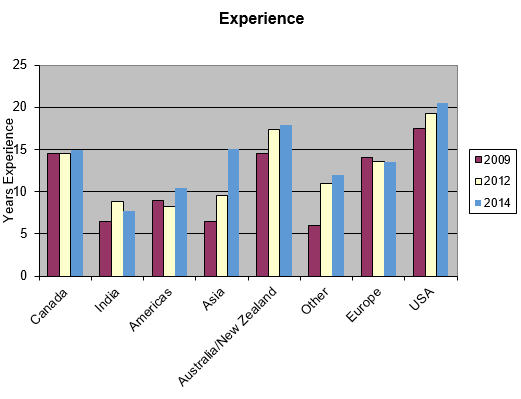
Salary
Unsurprisingly, salaries vary widely around the world. The following graphs show experience in years versus salary in US dollars for a number of regions.
Starting with the USA, salary increases for older engineers are shrinking:
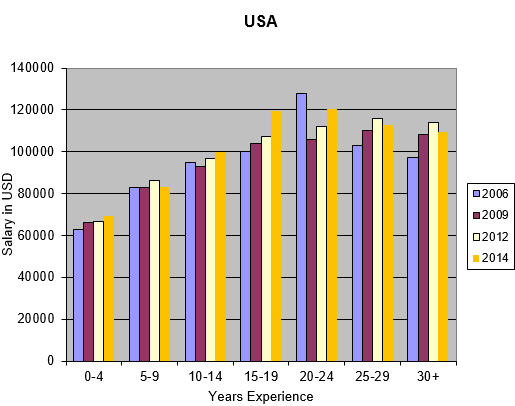
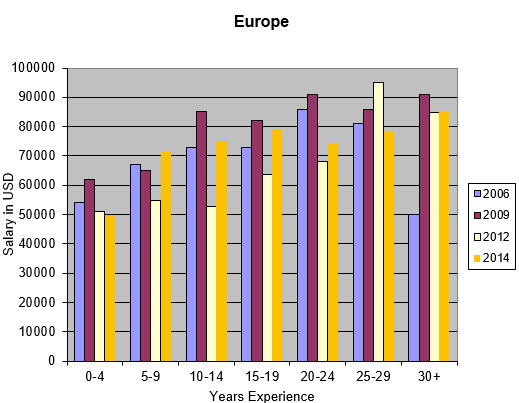
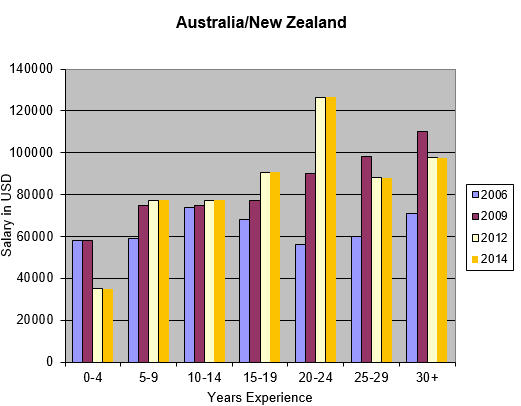
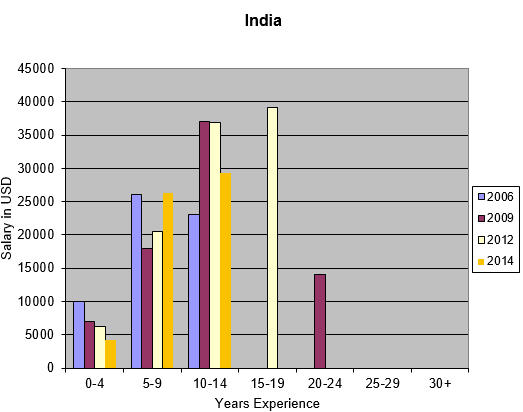
Benefits
This year I asked about benefits. The USA scores highly, perhaps because health care is a fairly standard benefit, while in many other countries that is provided for by the government.
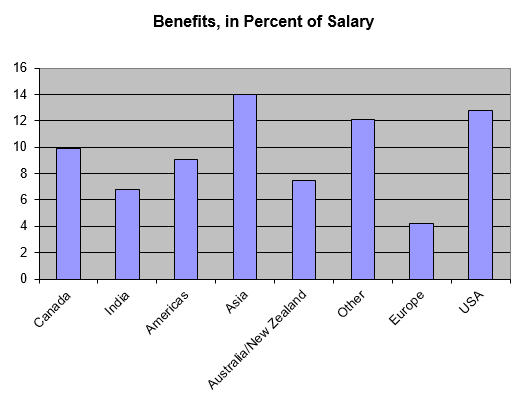
But the USA and Canada lag in paid vacation days per year:
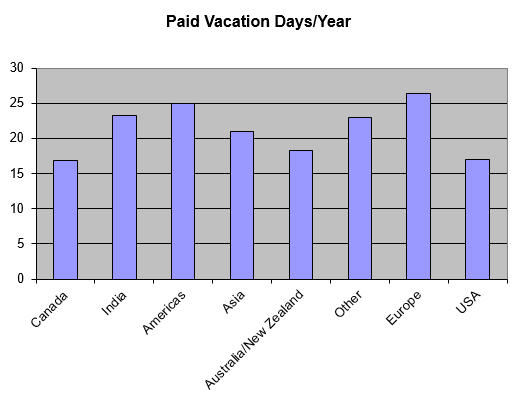
How hard are we working? Here's some data:
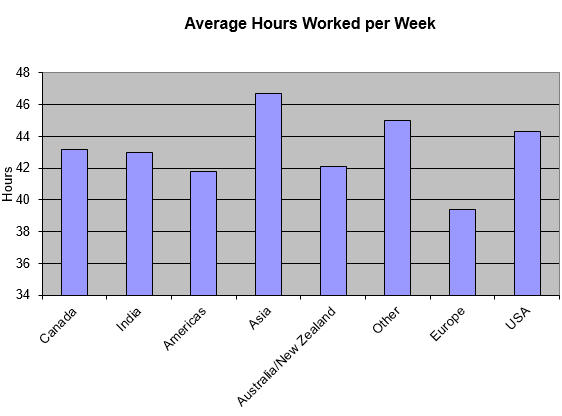
Perhaps attempting to measure happiness is a fool's quest, but having seen too many colleagues burn out from despair and overwork I'm convinced we must pursue happiness first and salary second. In the survey respondents rated their happiness with their career on an enumerated scale of [love it, reasonably happy, somewhat unhappy, hate it]. I rated the factors from 3 (love it) to 0 (hate it). .
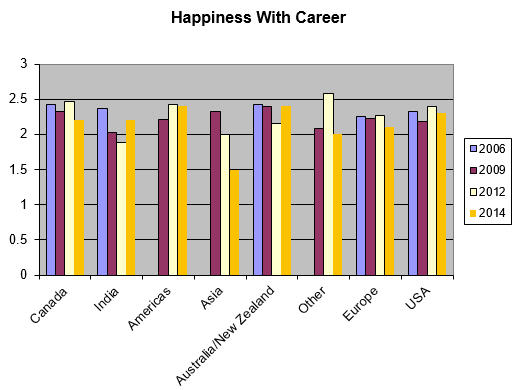
14% reported being consultants. 53% rated business as "about the same" as last year, 22% as "better," 4% as "hugely better," 9% as "worse" and 13% as "much worse." In the USA rates range from $55 to $400, though only one data point was about $200:
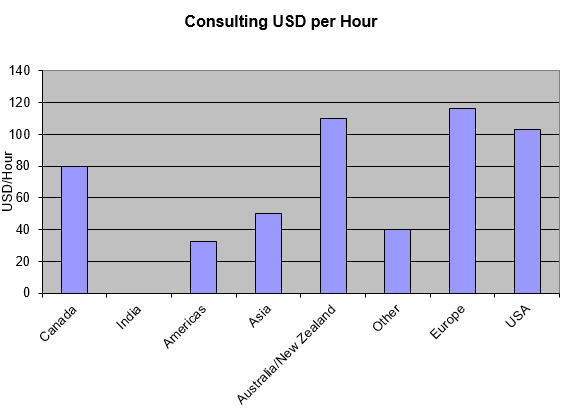
Comments
A lot of people left comments; some are listed here:
Brand new job. Optimistic about my future with the company but in general management doesn't realize just how complex firmware is these days.
CEO of day job continues to make excuses to not do across the board raises and try to scare people into staying with the impression that "it's worse out there" My company isn't known for high pay but this is getting repetitive and tedious. We have tried outsourcing but that never seems to have a great result and ends up being more trouble than it is really worth.
Company I work for keeps getting sold and the benefits package gets worse every time With major jumps in medical premiums/deductibles/co-pays I'd have to say that the current "package" represents a decrease in compensation. BTW: the only salary increases here in the past two years have been "stop-loss" bribes.
Creation is at the soul of mankind - and what career is better for that than engineering? That and being a husband, father and pet owner - what's not to like?
Current contract is designing embedded software for a medical device. Compared to industrial control systems where I worked for decades medical is a big step up in both compensation and the availability of all needed resources.
Currently working contract in an employer's market. Slim pickings on the Pacific coast. Highest demand appears to be for university education (Masters/Phd) with extensive experience in Linux and wireless technologies. College graduate loads of wireless only written Perl scripts for Linux. It'll get better in time. Always does.
Engineering like almost everything else depends on your perspective. If you believe there is no future then there is no future. If you believe there is a future then you make that future.
For this job I went in knowing the salary was a bit low. It is (was) a new industry for me and I was eager to get in the door.
I feel like a nanny that has to go around cleaning up a bunch of soiled international diapers.
I love what I do but with hindsight I wish I studied something else in my country.
I realize salaries in the SF Bay area are quite inflated compared to the rest of the country. Most of my staff are at or above the maximum salary range for their job function. Retention and competition for highly skilled embedded developers is a strong driver.
I work in a very resource restricted environment where staffing has dropped significantly over the last few years. We are however always expected to produce more of higher quality each year.
I'm looking. I've really enjoyed working here but management has become increasing disconnected from reality. It is highly likely that their decisions will "bear fruit" in the next 6 months. I just hope I a) find another employer and/or b) don't become the scapegoat.
In the UK there is a shortage of embedded engineers. We all seem to stay in the same under-paid jobs instead of moving around. A .net developer seems to be worth about 1 1/2 embedded engineers I can't quite figure this out.
It is a constant fight to keep the company from outsourcing our embedded work. I doubt that we will keep it in-house for more than another 2 years.
Management of technology and the ability to market to the right customers defines the success of any business. This is made more so with disruptive technologies. Commercialization is more difficult with hardware+software than just software because of huge capital outlays needed to roll out field trials and go through standardisation processes. This makes it particularly challenging for innovative startups no matter how innovative their products are. From observation large blue chip companies are not nearly as innovative as they make out and they stifle progress efficiency as well as ability for startups to take them on or an environment of innovation. This is life but I still don't think it is right direction we should be going in.
May 2013 pendulum swung away from me and I got laid off on Friday. Someone turned in his notice on Monday and I was rehired Tuesday.
My company and all of my friends' companies as well can't find enough good embedded software engineers. That's good for my short-term job security but bad for the growth of my company and others.
My dream of being an engineer started when I was 9 years old. My favorite quote is "Choose a job you love and you will never have to work a day in your life." So I have not worked a day in my life! (Just ask any manager I have worked for.) :)
My programming skills are being eclipsed by younger grads using latest C++11/14 techniques but they often miss the nuances of embedded design. Large scale memory and faster processors allow for sloppy code and oodles of threads. It used to be a craft to be concise. Last project had 7 processors on the board; they did not properly control interprocessor comm and had to go back and "refactor". Latest project has a dual core Linux platform!
Sadly I am making less money than I was in 1998. In my experience salaries have remained largely flat in the past 15 years and have even declined in many cases.
Tomorrow is my last day - I'm switching to an applications engineering position. This field changes so fast and working for a small company early on means you have to fight every day trying to convince senior guys that best practices and standards are worth while. I love firmware but I just can't fight against #ifdef misuse, global variables for everything, a total lack of respect for whitespace standards and absolutely awful commenting practices. Your work is excellent I just wish it could reach more people.
We have lost over 50 of our leadership and staff in the last 24 months due to voluntary resignations. The opportunities in the Minneapolis St. Paul area are incredible and this company cannot compete on salary culture or staff appreciation.

